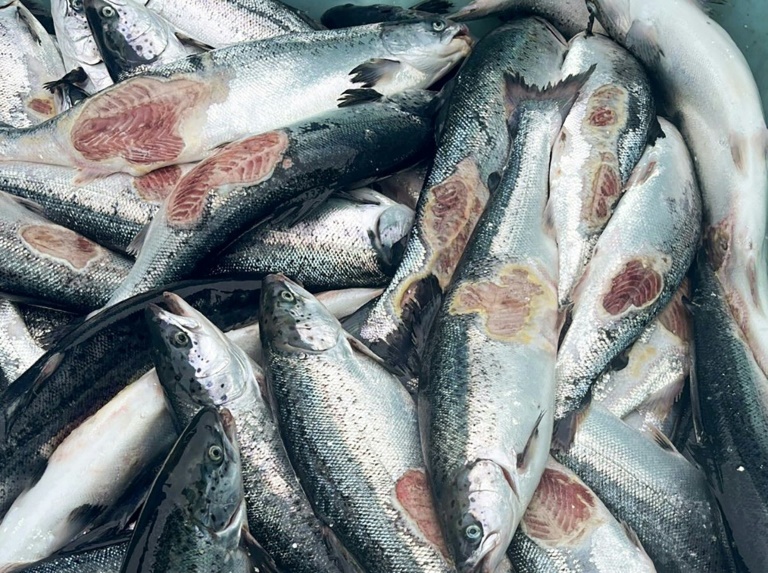Science
Study Reveals Pharmaceutical Pollution Threatens Salmon Migration

Pharmaceutical pollution poses a significant risk to salmon populations, as recent research highlights the adverse effects of drugs like clobazam on their migration patterns. A study conducted by the Swedish University of Agricultural Sciences reveals that juvenile Atlantic salmon (Salmo salar) exposed to clobazam experience enhanced migration success, raising concerns over the ecological impact of pharmaceutical waste.
The study found that exposure to clobazam, a medication commonly prescribed for sleep disorders, not only improved the ability of juvenile salmon to navigate through hydropower dams but also accelerated their migration from rivers to the sea. This research underscores an alarming trend: pharmaceutical contaminants in waterways are contributing to changes in the behavior and ecology of aquatic species.
Environmental Impact of Pharmaceutical Waste
Pharmaceutical waste from manufacturing processes continues to be a pressing environmental issue worldwide. Wastewater treatment plants, designed to process various contaminants, often release water containing pharmaceutical concentrations significantly higher than those discharged by standard utility plants. This includes substances such as antimicrobials, muscle relaxants, and opioids, which can lead to serious ecological consequences.
The study specifically monitored salmon in Sweden’s River Dal as they migrated to the Baltic Sea. Using slow-release pharmaceutical implants and tracking technology, researchers observed how clobazam and the opioid painkiller tramadol affected the fish’s behavior and migration capabilities. The findings suggest that these pharmaceutical pollutants could disrupt critical life-history events in migratory fish.
Dr. Marcus Michelangeli from the Griffith University’s Australian Rivers Institute commented on the significance of the findings, stating, “Pharmaceutical pollutants are an emerging global issue, with over 900 different substances having now been detected in waterways around the world.” He emphasized the potential impact of psychoactive substances, like antidepressants and pain medications, on wildlife behavior and brain function.
Regulatory Challenges and Future Solutions
Despite advancements in technology and regulatory frameworks, pharmaceutical waste remains a challenge for environmental safety. Regulations, such as those enforced by the U.S. Drug Enforcement Administration (DEA), aim to ensure controlled substances are destroyed in ways that prevent retrieval for illegal trade. Yet, theft and illicit markets persist, underscoring the need for more effective waste management strategies.
The study’s findings highlight the urgent need for pharmaceutical companies to innovate drug formulations that minimize environmental harm. By creating medications that break down more rapidly or are less toxic to aquatic ecosystems, the industry can play a crucial role in mitigating the effects of pharmaceutical pollution.
This research was published in the journal Science, under the title “Pharmaceutical pollution influences river-to-sea migration in Atlantic salmon (Salmo salar).” As awareness of the ecological impacts of pharmaceuticals grows, the call for action in both regulatory practices and corporate responsibility becomes increasingly critical.
The ongoing decline of Atlantic salmon populations, primarily attributed to overfishing and habitat loss, now faces an additional threat from pharmaceutical contaminants. Addressing this multifaceted problem will require collaboration among scientists, policymakers, and the pharmaceutical industry to safeguard both marine life and environmental health.
-

 Science3 months ago
Science3 months agoToyoake City Proposes Daily Two-Hour Smartphone Use Limit
-

 Top Stories3 months ago
Top Stories3 months agoPedestrian Fatally Injured in Esquimalt Collision on August 14
-

 Health3 months ago
Health3 months agoB.C. Review Reveals Urgent Need for Rare-Disease Drug Reforms
-

 Technology3 months ago
Technology3 months agoDark Adventure Game “Bye Sweet Carole” Set for October Release
-

 World3 months ago
World3 months agoJimmy Lai’s Defense Challenges Charges Under National Security Law
-

 Lifestyle3 months ago
Lifestyle3 months agoVictoria’s Pop-Up Shop Shines Light on B.C.’s Wolf Cull
-

 Technology3 months ago
Technology3 months agoKonami Revives Iconic Metal Gear Solid Delta Ahead of Release
-

 Technology3 months ago
Technology3 months agoApple Expands Self-Service Repair Program to Canada
-

 Technology3 months ago
Technology3 months agoSnapmaker U1 Color 3D Printer Redefines Speed and Sustainability
-

 Technology3 months ago
Technology3 months agoAION Folding Knife: Redefining EDC Design with Premium Materials
-

 Business3 months ago
Business3 months agoGordon Murray Automotive Unveils S1 LM and Le Mans GTR at Monterey
-

 Technology3 months ago
Technology3 months agoSolve Today’s Wordle Challenge: Hints and Answer for August 19









